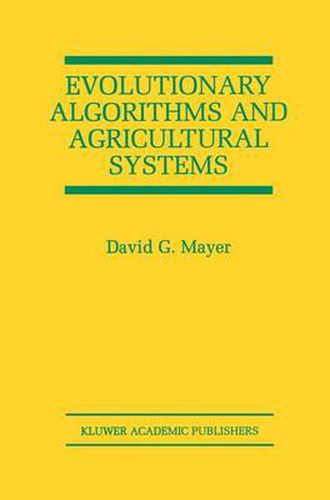Readings Newsletter
Become a Readings Member to make your shopping experience even easier.
Sign in or sign up for free!
You’re not far away from qualifying for FREE standard shipping within Australia
You’ve qualified for FREE standard shipping within Australia
The cart is loading…






This title is printed to order. This book may have been self-published. If so, we cannot guarantee the quality of the content. In the main most books will have gone through the editing process however some may not. We therefore suggest that you be aware of this before ordering this book. If in doubt check either the author or publisher’s details as we are unable to accept any returns unless they are faulty. Please contact us if you have any questions.
Evolutionary Algorithms and Agricultural Systems deals with the practical application of evolutionary algorithms to the study and management of agricultural systems. The rationale of systems research methodology is introduced, and examples listed of real-world applications. It is the integration of these agricultural systems models with optimization techniques, primarily genetic algorithms, which forms the focus of this book. The advantages are outlined, with examples of agricultural models ranging from national and industry-wide studies down to the within-farm scale. The potential problems of this approach are also discussed, along with practical methods of resolving these problems.
Agricultural applications using alternate optimization techniques (gradient and direct-search methods, simulated annealing and quenching, and the tabu search strategy) are also listed and discussed. The particular problems and methodologies of these algorithms, including advantageous features that may benefit a hybrid approach or be usefully incorporated into evolutionary algorithms, are outlined. From consideration of this and the published examples, it is concluded that evolutionary algorithms are the superior method for the practical optimization of models of agricultural and natural systems. General recommendations on robust options and parameter settings for evolutionary algorithms are given for use in future studies.
Evolutionary Algorithms and Agricultural Systems will prove useful to practitioners and researchers applying these methods to the optimization of agricultural or natural systems, and would also be suited as a text for systems management, applied modeling, or operations research.
$9.00 standard shipping within Australia
FREE standard shipping within Australia for orders over $100.00
Express & International shipping calculated at checkout
This title is printed to order. This book may have been self-published. If so, we cannot guarantee the quality of the content. In the main most books will have gone through the editing process however some may not. We therefore suggest that you be aware of this before ordering this book. If in doubt check either the author or publisher’s details as we are unable to accept any returns unless they are faulty. Please contact us if you have any questions.
Evolutionary Algorithms and Agricultural Systems deals with the practical application of evolutionary algorithms to the study and management of agricultural systems. The rationale of systems research methodology is introduced, and examples listed of real-world applications. It is the integration of these agricultural systems models with optimization techniques, primarily genetic algorithms, which forms the focus of this book. The advantages are outlined, with examples of agricultural models ranging from national and industry-wide studies down to the within-farm scale. The potential problems of this approach are also discussed, along with practical methods of resolving these problems.
Agricultural applications using alternate optimization techniques (gradient and direct-search methods, simulated annealing and quenching, and the tabu search strategy) are also listed and discussed. The particular problems and methodologies of these algorithms, including advantageous features that may benefit a hybrid approach or be usefully incorporated into evolutionary algorithms, are outlined. From consideration of this and the published examples, it is concluded that evolutionary algorithms are the superior method for the practical optimization of models of agricultural and natural systems. General recommendations on robust options and parameter settings for evolutionary algorithms are given for use in future studies.
Evolutionary Algorithms and Agricultural Systems will prove useful to practitioners and researchers applying these methods to the optimization of agricultural or natural systems, and would also be suited as a text for systems management, applied modeling, or operations research.